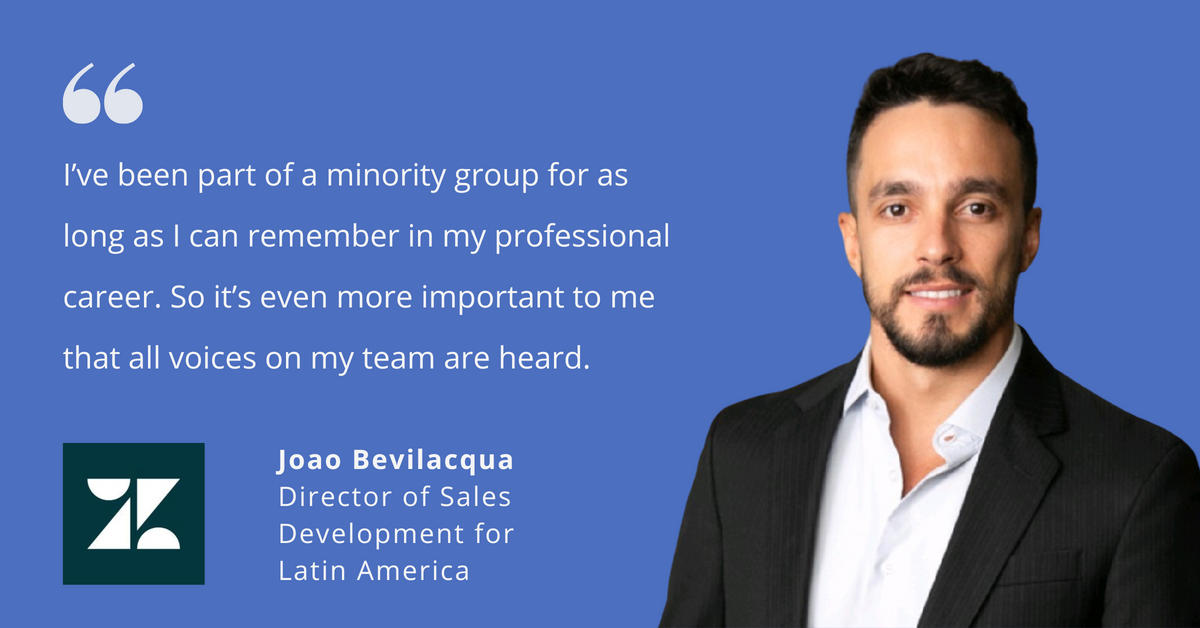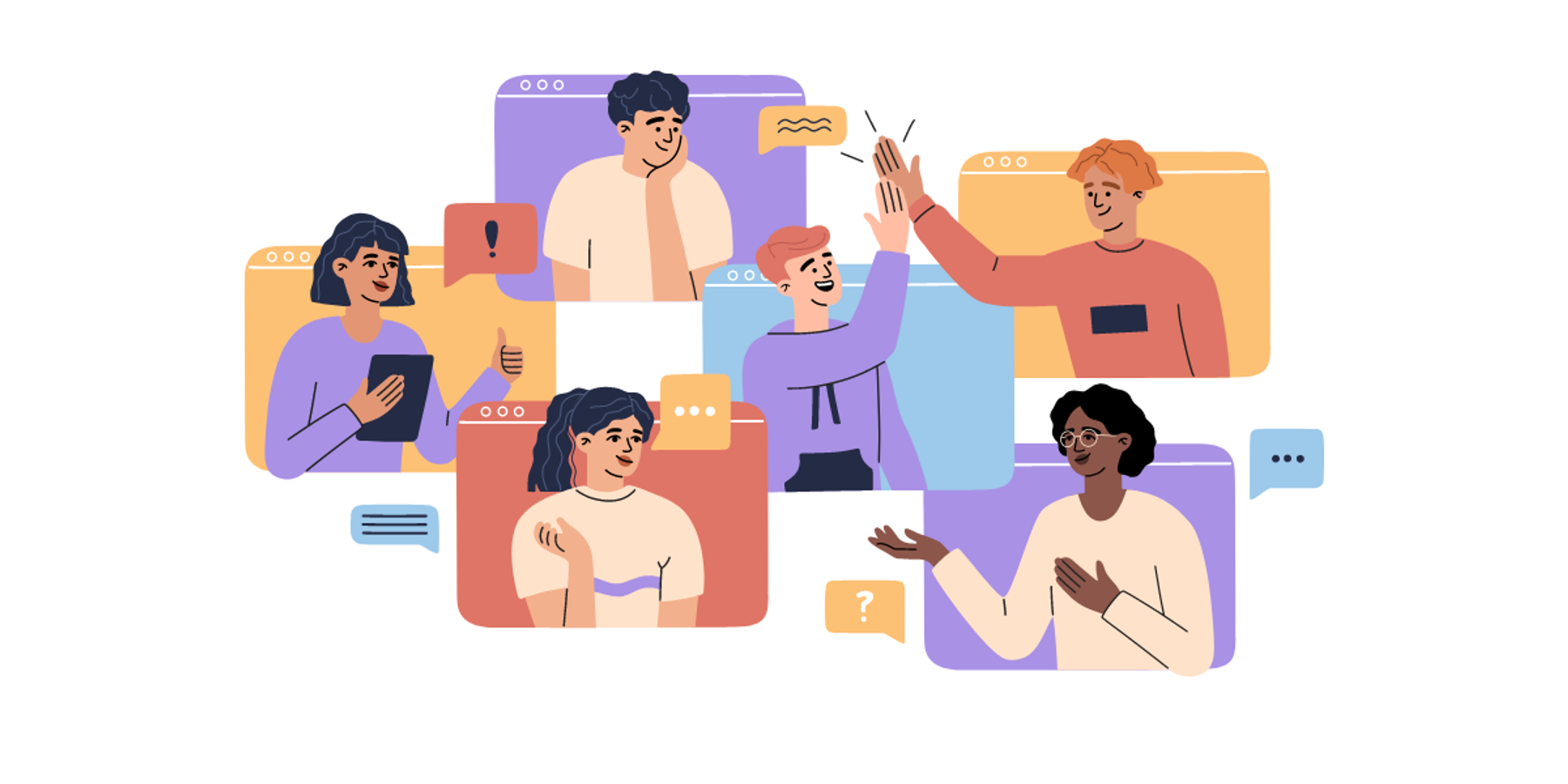Joao Bevilacqua likes to lead his Sales team through a breathing exercise at the start of meetings.
“I teach my team that when they’re stressed or anxious about joining a call with a prospective customer, just take a step back and do this two-minute exercise to get your adrenaline levels under control again,” shares Joao.
While it’s fitting that Joao works at a company called Zendesk, his love for mindfulness started long before he joined the service-first CRM company.
Joao has been practicing yoga for 20 years.
Grounding his sales team is just one way that Joao leverages his practice and recent instructor certification to help his colleagues feel safe, comfortable, and empowered in their roles. The overarching goal? To foster an inclusive environment — even when the team is spread across multiple countries.
“As a gay cisgender man, I’ve been part of a minority group for as long as I can remember in my professional career. So it’s even more important to me that all voices on my team are heard and that we’re bringing in diverse talent,” Joao says.
We sat down with Joao to learn how he promotes diversity and inclusion on his remote team, including more surprising ways that his yoga practice influences his strategy.
Finding the Right Pace
Joao learned the value of stepping back and catching your breath a bit later in life. Prior to studying yoga and joining Zendesk, Joao was a professional swimmer and an investment banker, both of which encouraged him to move as quickly as possible. Even though he excelled in both arenas, Joao eventually realized that he was trying to fit a square peg in a round hole.
“It just wasn’t me. It’s one thing to learn a lot, grow a lot, and make decent money, but it’s another to align your life with where you actually want to be,” he shares.
After taking a leave of absence from his banking career, Joao gained the perspective he needed. “I was like, yeah, I’m not going back,” he laughs. “I have to figure out what makes sense for me.”
This exploration eventually led Joao into a sales role where he enjoyed the pace and creativity of a startup environment. At the time, he had a few friends working at Zendesk, and he was impressed by the quality and brand of the product.
Even more, the culture struck a chord with him.
“Something that I learned earlier in my career is that, no matter what you’re selling or where you’re selling it, having a culture that you really align with is fundamental to your well-being,” Joao says. He accepted a position as Zendesk’s director of sales development for Latin America and now leads a team of 60 people. And while he inspires his team to achieve their sales targets, another goal hits closer to home: creating a diverse and inclusive environment where all team members can thrive.
Dismantling Barriers at Zendesk
Joao recently attended a Zendesk leadership training that included a diversity and inclusion presentation. Walking away, one line stuck with him: “The biggest harm you can do in diverse groups is keeping privilege with the people who are like you.”
For Joao, this means that if we only reward those who are similar to us — even if we’re not directly harming those who are different from us — imbalance grows. And as a leader in Latin America, Joao immediately connected this to the inequity that stems from language barriers. “English is a big hurdle. We usually require it to get people in the door,” he says.
The way Zendesk is working to remove this obstacle is just one example of its active stance against discrimination and commitment to equity: the company created a professional development fund for new hires that can be put towards learning English.
“It allows us to flex on the job language requirements while giving someone the language skills that will help them succeed not just in Zendesk but also in their overarching career,” adds Joao.
Of course, remote work brings a new set of challenges to the diversity conversation.
“When everyone moved to this remote world, diversity initiatives got a little fuzzier. So understanding how we can keep on including people, inviting them to the conversation, and making sure we have adequate training is ever more challenging and ever more necessary,” shares Joao.
At Zendesk, team members attend regular diversity, equity, and inclusion training on topics like bias, microaggressions, and allyship. Meanwhile, leaders are coached on everything from fostering inclusion and psychological safety on their teams to promoting the growth and advancement of marginalized groups. Zendesk approaches systemic elements as well like mitigating bias in performance assessments and intentionally centering inclusion and equity in hiring practices.
“We aim to keep the conversation alive,” Joao adds in regard to the high frequency of the training.
Joao also recognizes that while it’s important for diversity initiatives to stem from leadership, an effective strategy includes a bottom-up approach. His sales department has many early-career professionals, so he requires the managers under him to achieve Zendesk’s Inclusion in Action hiring commitment which focuses on diversifying the candidate pipeline through the interview process, ensuring underrepresented talent reach the final interview stages. The whole team is committed to opening the door for more talent from underrepresented groups to climb the ladder.
Bringing His Yoga Practice to the Workplace
Joao is a big believer that an individual's ability to climb the ladder starts with feeling comfortable enough to take hold of it. This involves feeling safe, seen, and valued in the workplace, no matter one’s background.
To create this environment, Joao pulls inspiration from what he knows best: his yoga teacher certification.
As an instructor, he’s acutely aware of the people around him, whether it’s sensing someone’s tension in a pose or through a Slack message.
“I have to be very mindful of everyone in the room, looking for disconnections in their movement, so that I can help correct, improve, or evolve their practice,” shares Joao. This extends from correcting a yogi’s Downward Dog to providing guidance to a colleague who’s feeling anxious about a sales call.
He also understands the importance of checking in with our bodies and recognizing when we’re pushing too hard. In the workplace, this means coaching his team through mindfulness activities and helping them to slow down and stay present.
“When you think about this generation of burnout and overstress — I mean really understanding the early signs of anxiety — that starts somewhere in the body. So being connected to whatever you’re feeling in the moment can help prevent you from reaching the breaking point,” he shares.
By channeling his yoga practice at work, Joao has created an environment where diverse professionals not only get hired, but they want to stay.
5 Ways to Promote Diversity & Inclusion on a Remote Team
Whether you’re an individual contributor, senior leader, or fellow yogi, Joao’s advice can be applied to how you build a diverse and inclusive workplace:
- Don’t assume. Instead, ask: “Don’t assume you understand how the person is feeling on the other side. Ask about it. Manage with compassion,” shares Joao. This involves being mindful of people’s well-being. “It’s easier for your colleagues to fake it on a computer screen than in person. So as a leader, be proactive about leading the conversation toward a warm and open environment.”
- Create space. “When I start a meeting with an icebreaker, it often turns into a bonding moment for the team that creates psychological safety. They can express whatever concerns they’re having, not just with me, but with their peers,” says Joao. He often finds that this circle of trust then drives collaboration.
- Model the behaviors that you want to see in others. This starts with Joao taking time off from work, not messaging people when they’re on vacation, and not responding to emails when he’s on vacation. But beyond resting and recharging, Joao also sets an example of how to promote diversity. “When people look at my team, I want them to see that I’m actively working on building a diverse organization. This is not happening by chance.”
- Be knowledgeable. “There is a lot of material out there that covers everything from breaking down biases to the definition of intersectionality to how diversity makes a stronger workforce. Understand the impact and why this is important,” shares Joao.
- Understand that diversity means different things in different places. Joao wraps up by pointing out the diversity spectrum; what this looks like for him in Brazil is different than the conversations his colleagues are having in the US, Mexico, Dublin, and beyond. “These places are different, and that’s going to come with different biases and blind spots,” he shares. “You can be a leader for five, 10, 15 years — and then you run a global team, and it’s a completely new challenge. Which brings me back to the first tip: don’t assume, ask.”
If you’re interested in careers with an employer that values diversity and inclusion, check out Zendesk’s opportunities here.




